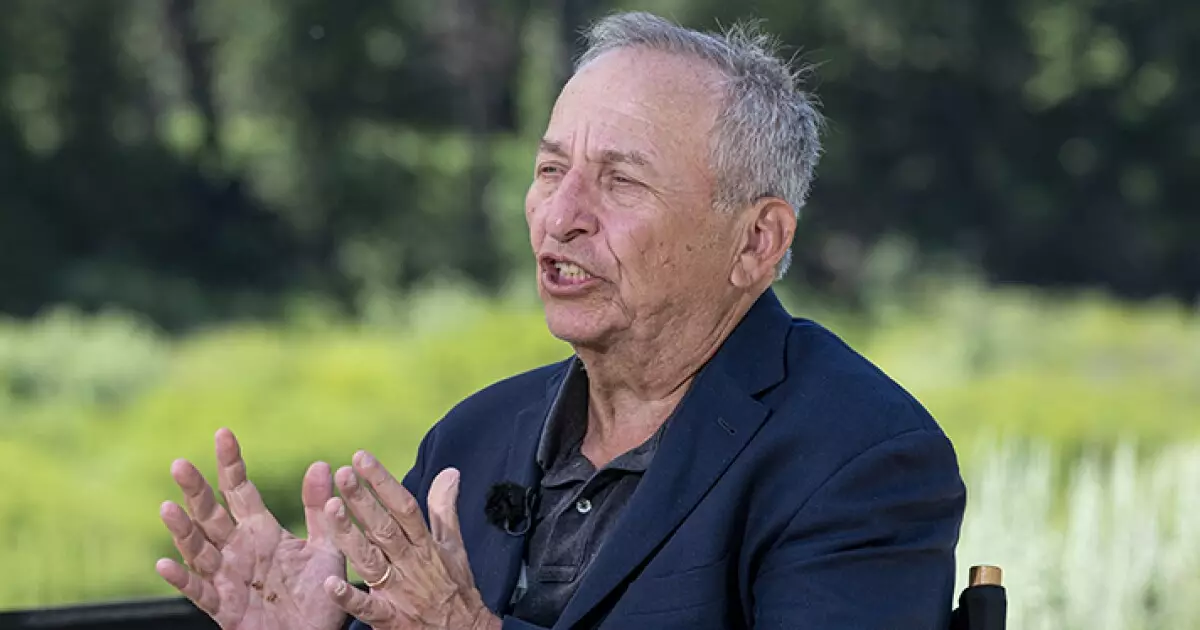Lawrence Summers, former Treasury Secretary and a voice of reason in the often chaotic landscape of U.S. economic policy, has recently weighed in on President Donald Trump’s forthcoming decision regarding the Federal Reserve Chair. With whispers of impending interviews and potential candidates swirling around the political landscape, one striking observation arises: how much of this is genuine consideration for the nation’s economic health versus a staged show aimed at mitigating blame if the economy falters? Trump’s harsh critiques of current Fed Chair Jerome Powell appear less about policy nuances and more towards strategic positioning ahead of an uncertain economic future.
Summers’s confidence that Trump will choose a “reasonable person” to lead the Fed reflects a nuanced understanding of the political stakes involved. Trump’s repeated jabs at Powell for maintaining interest rates, which he insists should be significantly lower, seem calculated. They align him as a populist voice against perceived institutional failures; a classic technique in which leaders confuse their role and responsibilities. As any observer knows, the political scene is rife with blame games, and Trump is simply playing the cards he has been dealt while preparing an arsenal for potential economic downturns.
Stable Leadership amid Market Volatility
The landscape of an impending Federal Reserve chair appointment is explosive. The Fed’s decisions directly impact ordinary Americans’ economic lives, and any instability in this leadership can precipitate market reactions that ripple far beyond Wall Street. Summers emphasizes that Trump’s choice is likely to be a figure recognized for their competence, largely influenced by the necessity to maintain market confidence. This is where the administration must strike a precarious balance; maintaining the facade of control while ensuring that those they elevate are not seen as mere puppets of erratic policy.
Of note in this context is the monetary policy that the Fed undertakes, which transcends simple interest rate adjustments. The critique of Powell by Trump may have merit under economic justification, but it also opens the door to dangerous precedents. Should Trump appoint someone more pliable, the autonomy of the Fed becomes compromised, trading sound economic principles for political expediency. What remains to be seen is whether Trump’s search for a new chair will yield a truly independent thinker or simply a figurehead willing to echo his strategies to avoid the backlash of an economic downturn.
Economic Realities vs. Political Theater
As Summers suggested, Trump’s calls for lower rates could serve dual purposes: a genuine desire to stimulate growth and a ploy to pivot blame if a recession hits. This begs the question—are we observing a strategic economic policy or merely a political theater designed to keep Trump’s brand intact? The truth is, critiques of the Fed should be constructive rather than combative. If Trump were vested in genuine improvement, he could be harnessing the power of the Fed to align with his economic visions instead of treating it as a punchline to his governance.
Additionally, Summers highlights the looming supply shock exacerbated by tariffs—an aspect often overshadowed by headline-grabbing political narratives. Economic complexities such as inflation and unemployment revisions reflect serious repercussions stemming from administration policies. Trump’s trade strategies have not only fostered domestic tensions but could also unleash damaging inflationary pressures. In this light, the choice for the next Fed Chair becomes much more than a mere appointment; it is a reflection of understanding economic intricacies rather than simple populism.
The Dance of Economic Policy and Political Ambition
Ultimately, Trump’s upcoming decision on Federal Reserve leadership is emblematic of a broader tension in contemporary American politics: the struggle between principled economic policy and the relentless pursuit of political gain. As we look toward the future, Trump’s expected embrace of a mainstream candidate should not be solely lauded; it requires scrutineering through the lens of authenticity and capability rather than political favoritism.
As many of us grapple with the nuances of financial recoveries, one can only hope that the resulting appointment does not merely echo the whims of a presidency focused on optics, but rather represents an ideal that fosters growth, stability, and resilience amid the ongoing challenges that characterize the modern economy. The reality remains that economic prosperity will hinge not only upon who leads the Fed but whether that choice is backed by sound reasoning as opposed to transient political ambition.


Leave a Reply